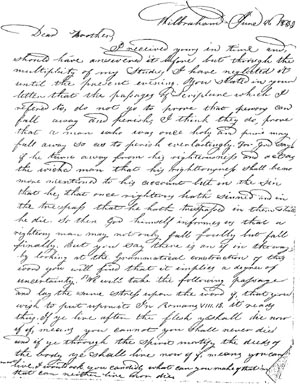 Click to enlarge details
Click to enlarge details |
 Click to enlarge details
Click to enlarge details |
|
|
 Click to enlarge details
Click to enlarge details
|
 Click to enlarge details
Click to enlarge details
|
For My Cousins |
1833 Letter by Joseph S. Ellis
Go to Joseph's web page for details about his life and family. |
Home Page
What's New Photo Index Surnames List Previous Image Next Image |
 Click to enlarge details
Click to enlarge details |
 Click to enlarge details
Click to enlarge details |
|
|
 Click to enlarge details
Click to enlarge details
|
 Click to enlarge details
Click to enlarge details
|
| Letter dated June 26, 1833 from Joseph S. Ellis to his brother Harmon Ellis. Both brothers were reverends. For more information about Joseph and his family, go to Joseph's web page.
Here's my attempt to transcribe this letter: Wilbraham June 26, 1833 [Return address on envelope says Wilbraham, Mass., June 29 -- addressed to Rev. Harmon Ellis, Norfolk, Conn. -- a note written in someone else's handwriting says "living in 1885 near Medina"] Dear Brother, I received yours in time and should have answered it before but through the multiplicity of my studies I have neglected it until the present evening. You stated in your letter that the passages of scripture which I refered [SIC] to, do not got to prove that persons can fall away and perish; I think they do prove that a man who was once holy and pure may fall away so as to perish everlastingly. For God says if he turns away from his righteousness and act as the wicker man that his righteousness shall be no more mentioned to his account but in the sin that he's that once righteous hath sinned and in the tresspass that he hath trespassed in them shall he die. To then God himself informs us that a righteous man may not only fall foully [fully ??] but fall finally. But you say there is an if in the way, by looking at the grammatical construction of this word you will find that it implies a degree of uncertainty. We will take the following passage and lay the same stress upon the word if that you wish to put upon it. In Romans VIII.13 it reads thus. If ye live after the flesh ye shall die now if if, means you cannot you shall never die, and if ye through the spirit mortify the deeds of the body ye shall live now if if, means you can not live. I won't ask you candidly what can you make of that in that can neither live nor die. While examining your letter I must confess that I was not a little surprised to find that you do not understand what is ment [SIC] by the doctrine of unconditional election and reprobation when there is so much said about it. What I understand by the doctrine of unconditional election is that those of mankind that are elected unto life, go, before the foundation of the was laid, according to his eternal and immutable _____, and the secret counsel and good pleasure of his will, hat chosen in Christ unto everlasting life out of His ____ free grace and love; without any foresight on good works or perserverance in either of them on any other thing in the ______ as conditions or causes moving him ___________. By reprobation I mean that the rest of mankind God was pleased to ____ by and to ordain them to dishonor and wrath for their sins. Please to answer the above and tell me whither you believe in the doctrine of conditional or unconditional doctrine. I remain every your affectionate Brother - Joseph S. Ellis P.S. The cause of God is prospering among us; there [are] a large number of students this term. I am a going to work one month for the Institution. Write me soon. J.S. Ellis Copy of letter courtesy of Tim Pletkovich |
Image # 1805a (Ltr1a)
Home Page * What's New * Photo Index * Surnames
Last update of this page - Jan. 29, 2011
Validate Code